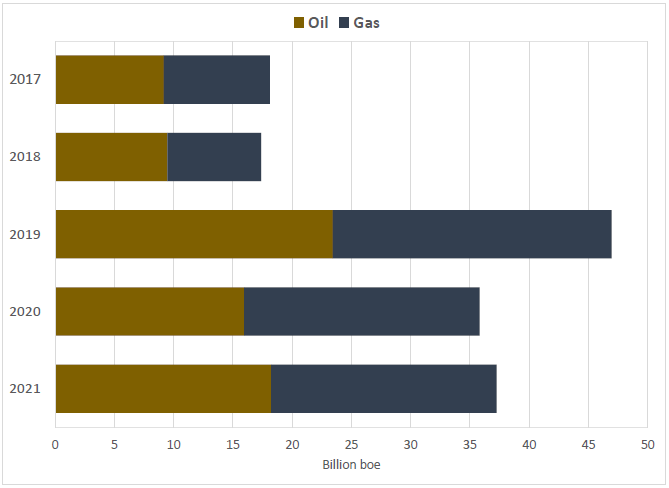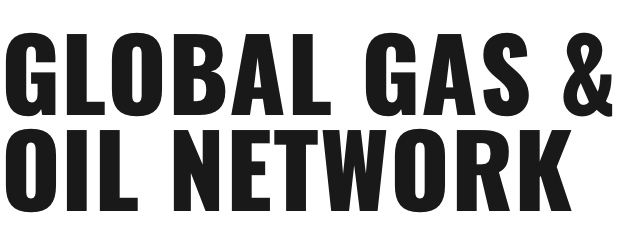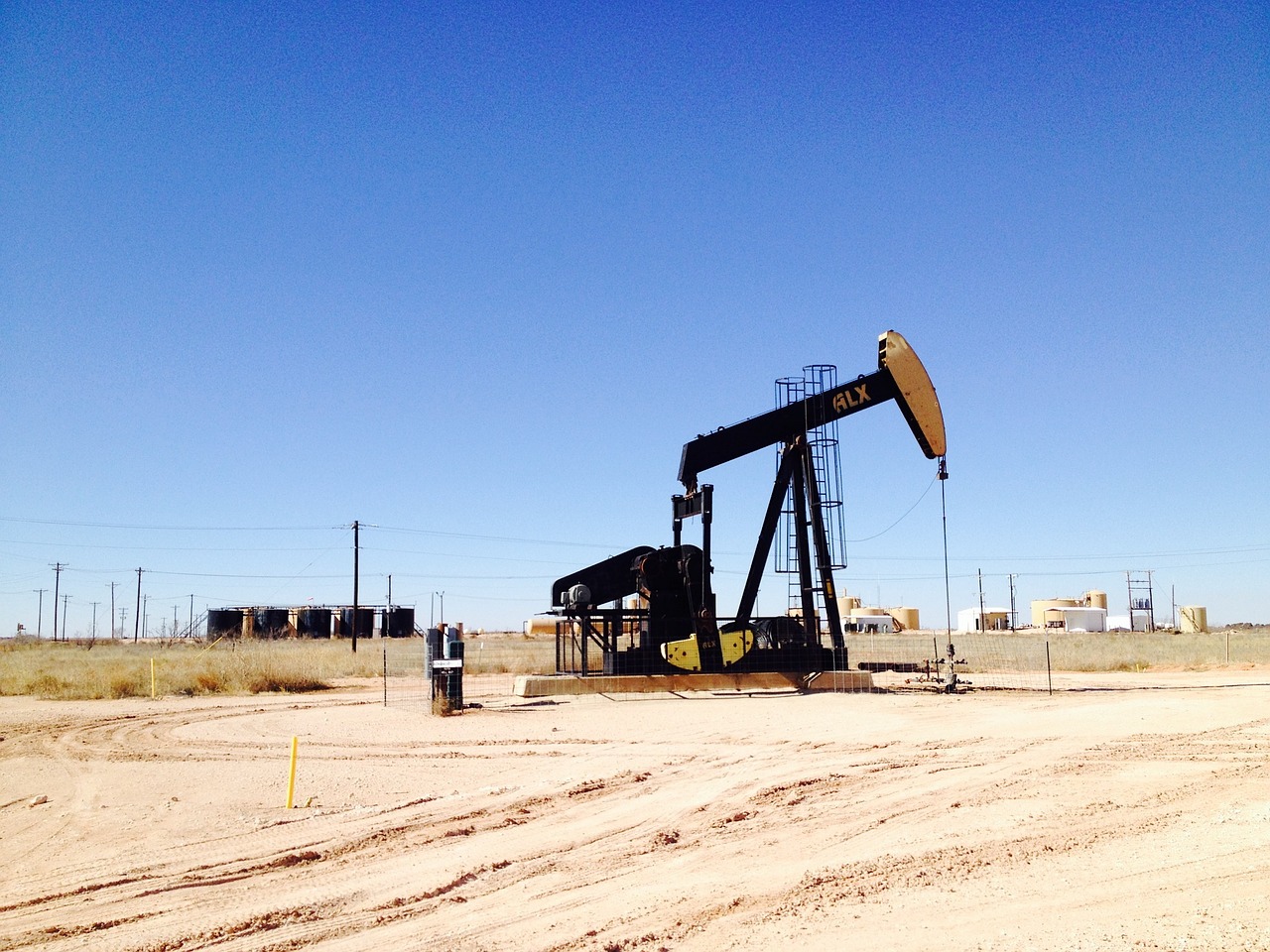THE BIG PICTURE
As we head into annual meeting season, oil majors are under pressure to respond to investors skeptical of their future profitability under climate constraints, or what the Financial Times terms the industry’s “existential crisis.”
That pressure ratcheted up last week. Norway’s government moved to divest the world’s largest sovereign wealth fund from upstream exploration and production companies. The move spared oil majors for now. But the long-term market signal, first broadcast by the World Bank in 2017, is clear: Climate and financial stability lie in shifting investment away from fossil fuel extraction.
For now, oil majors continue to resist real change to their business models. BP, Shell, and Equinor are investing millions in new ad campaigns that spin fossil fuels as part of the energy transition, rather than obstacles to it. The same companies continue to invest billions in maintaining and expanding their oil and gas production – Equinor’s push to drill in the Great Australian Bight is a case in point.
If oil majors stop actively resisting the energy transition, do they have a role in it? Nick Stansbury, an asset manager at one of the UK’s biggest investment firms, is skeptical: “In our view the most shareholder-friendly option is to make a commitment now to a managed decline.” The first step down that path would be for oil companies to stop investing in their own expansion.
–The OilWire Team
The Data
Despite giving lip service to the energy transition, oil and gas companies continue to plan for major expansions in production.
Earlier this week, the International Energy Agency projected that the “second wave of the U.S. shale revolution” will drive 70 percent of global oil supply growth over the next five years – while making no mention of the climate consequences.
Meanwhile, Rystad Energy projects that the volume of new, non-shale oil and gas sanctioned for development in 2019 will nearly triple compared to 2018, in part due to several delayed investment decisions. Beyond field expansions in Saudi Arabia, Russia, and Qatar, key projects expected for approval in 2019 include: Area 1 and 4 LNG in Mozambique, the next phases of Exxon’s Liza project in Guyana and the Inpex-Total Ichthys LNG project in Australia, and Total’s Tilenga oil project in Uganda.
Projected Oil and Gas Volumes Approved for Development (without shale)

Source: Oil Change International, Rystad Energy UCube, March 2019
What We’re Tracking
Trends in the Right Direction
Norway’s decision to divest from upstream companies puts Big Oil on notice
Western Europe’s largest oil producer announced plans last week to divest its USD 1 trillion sovereign wealth fund – the world’s largest – from oil and gas exploration and production companies. Companies subject to the exclusion include top U.S. fracking companies, tar sands producers, and China’s largest offshore oil and gas producer. This move by the centre-right Norwegian government falls short of the full sector divestment originally recommended by the fund in 2017. But, as the Financial Times reports, it will “still reverberate in the boardrooms” of oil majors like ExxonMobil and BP. Norway’s Finance Minister tied the decision to spare integrated companies to their potential to invest in the renewable energy transition (despite a poor track record to date), signaling that Big Oil’s reprieve is contingent upon ultimately getting out of oil. To Nick Stansbury, one of London’s most prominent asset managers, “the most shareholder-friendly option is to make a commitment now to a managed decline.”
Enbridge concedes delay of Line 3 pipeline to late 2020
Another Canadian export pipeline is stalled, further limiting the growth of tar sands production. Enbridge announced this month that its Line 3 project, originally scheduled to start piping crude by the end of 2019, will not be in service until the latter half of 2020. That schedule will depend yet on the Minnesota state permitting process, pending legal challenges, and ongoing grassroots resistance. The Alberta government put oil production limits in place at the start of 2019 in reaction to pipeline constraints and falling prices. This shows that campaigns to stop export pipelines are keeping oil in the ground. Producers MEG and Imperial Oil recently announced they are rethinking plans to expand their output.
Costa Rica extends oil drilling ban through 2050, citing decarbonization plan
Costa Rica, the first nation to prohibit oil exploration and drilling activity, has officially extended this ban through 2050. The executive order was signed by President Carlos Alvarado Quesada the day after he announced his government’s plan to completely decarbonize Costa Rica’s economy by 2050. He described the measure as part of his government’s commitment to decarbonization and “to keep our country free of activities that may threaten our ecological balance.”
Utility study: Germany can exit coal without new gas
A study conducted by one of Germany’s largest energy companies, and obtained and reported on by Bloomberg, indicates that the country’s exit from coal will not trigger rising demand for gas. The study sees gas demand in Germany, the Netherlands, Belgium, France, and the UK falling over the next decade. It indicates that renewables with battery storage are likely to emerge as the most cost-effective replacement for coal. These findings, which were not made public, contrast with German utilities’ and Chancellor Angela Merkel’s public boosting of new gas investment.
Insights
Experts detail UK’s fossil-fueled export finance to parliamentary inquiry
Last month, experts from Oil Change International, the Overseas Development Institute, and Carbon Tracker Initiative told a UK parliamentary inquiry that UK Export Finance (UKEF) is undermining the country’s climate commitments with its support for fossil fuels. Over the last few financial years, 99.96 percent of UKEF’s support for energy exports to low- and middle-income countries was for fossil fuels. The testimony came on the heels of an op-ed from former UN Secretary General Ban Ki-Moon, who called out the UK’s fossil fuel finance as “hard to reconcile” with the Paris Agreement and “the opposite of sustainable development.”
Frontline leaders in California demand oil phase-out with a Green New Deal
In this op-ed, Miya Yoshitani and Gladys Limón, environmental justice leaders in California, underline that a Green New Deal in their state should “star[t] in the neighborhoods most impacted by racism, poverty and pollution,” which are also disproportionately where the oil and gas industry operates. The response must include “phasing out oil and gas production” as well as “building new ways to power our neighborhoods.”
As UK exits coal, it’s time to plan for a just transition off oil and gas too
Josh Burke at the Grantham Research Institute argues that, as the UK reaches another milestone towards phasing out coal power, much work is left to be done planning for a just transition – not only for coal workers but for the oil and gas sector too. Burke emphasizes that “a clear domestic policy on energy workforce transitions is urgently needed,” particularly given the potential for an “accelerated reduction in oil and gas production.”
Campaign News
‘Fight for the Bight’ heats up as Equinor presses ahead with risky drilling plan
Thousands of people “paddled out” along Australia’s southern coast in early March to protest Norwegian oil company Equinor’s plan to start exploratory offshore drilling in the Great Australian Bight, which is a biodiversity hotspot. Equinor’s environmental plan, open for public comment through 20 March, shows a worst-case spill could threaten the whole southern coast and creep as far north as Sydney. The plan is stirring controversy in Norway, too, where activists have long fought to protect the sensitive Lofoten Islands from offshore drilling. Earlier this week, a member of parliament urged Norway’s petroleum minister to use the country’s stake in Equinor to stop the plan, warning that “Norway could become the enemy” in Australians’ fight for the environment.
Argentine activists block fracking waste dump site in Patagonia
In Argentina, activists continue to draw attention to oil companies’ illegal dumping of toxic waste from fracking operations in the Vaca Muerta shale region, following the lawsuit filed by the Indigenous Mapuche Confederation in December. In late February, activists with Greenpeace Argentina blocked access to a waste site used by several major drillers for a day, calling on oil companies to “stop contaminating the Patagonian ecosystem with toxic waste.”
Bloomberg pledges support for oil and gas phase-out
Billionaire Michael Bloomberg announced that he will stay out of the U.S. presidential race. Instead, he is expanding his climate initiatives from Beyond Coal to Beyond Carbon. “I will expand my support for the Beyond Coal campaign so that we can retire every single coal-fired power plant over the next 11 years,” Bloomberg pledged, “And second, I will launch a new, even more ambitious phase of the campaign – Beyond Carbon: a grassroots effort to begin moving America as quickly as possible away from oil and gas and toward a 100 percent clean energy economy.”
More Headlines
Oil spill wreaks ‘ecological disaster’ on Solomon Islanders
An oil spill caused by a run-aground cargo ship in the South Pacific is the worst human-made disaster to ever hit the Solomon Islands, The Guardian reports. The contamination has forced residents to stop fishing and stay out of the water, causing water and food shortages and health problems. Not yet contained, the spill has been spreading for over a month and endangers a UNESCO World Heritage site on East Rennell Island, home to the largest raised coral atoll in the world.
Argentine minister pitches Vaca Muerta investment
Despite resistance from Indigenous communities, the Argentine government is plowing ahead with plans to ramp up shale extraction in Vaca Muerta. At an energy conference in Houston, Texas, this week, Argentina’s energy minister pitched plans to invest more in infrastructure, including plans to award USD 1.8 billion in pipeline construction contracts by the fall. Minister Gustavo Lopetegui plugged the need for up to USD 10 billion in investment per year to accelerate production growth.
Cleanup in Ogoniland lags as Nigerian government takes over oil lease
In March, the Nigerian government officially moved to take over controversial oil block OML 11 in Ogoniland from Shell, sparking fear that the government will forcefully resume oil activities in the region. Local residents still suffer from the health and environmental impacts of widespread pollution left behind when peaceful protests led Shell to leave Ogoniland in 1993. Civil society groups say the government’s cleanup effort remains sluggish and poorly managed. Shell meanwhile faces a potential trial in The Hague over its complicity in the 1995 execution of nine Ogoni activists, as four of their widows continue to seek justice.
Gas industry pushes plastics buildout in Appalachia
With a Shell cracker plant under construction in Pennsylvania, and two more plants under consideration in Ohio and West Virginia, the gas industry is threatening to turn the U.S. Appalachian region into a hub not only for fracking but also for petrochemical infrastructure. InsideClimate News digs into the potential health, climate, and economic impacts. The oil and gas industry is eyeing plastics as a driver of demand and profits into the future.
Industry News
Documents reveal BP’s hypocrisy on methane rules
BP lobbied to roll back U.S. methane regulations at the same time that the company was publicly portraying itself as leading industry efforts to curb methane pollution. Documents analyzed by Greenpeace “show a pattern of behaviour related to U.S. methane regulation that jars with BP’s calls to cut emissions,” the Financial Times reports.
Exxon and Chevron announce plans to triple U.S. Permian production
Further signaling that oil majors are going all-in on fracking in the United States, Exxon and Chevron said this month that they expect to each produce nearly 1 million barrels of oil per day from the Permian Basin by the mid-2020s, roughly tripling their production. Oil majors’ economics of scale are enabling them to profit from shale drilling at lower oil prices, compared to smaller producers. As recent research shows, this scale of U.S. expansion is far out of line with meeting global climate goals.
Shell faces more bribery charges, criminal prosecution in Dutch court
Dutch prosecutors are preparing a series of criminal charges against Shell – for bribery in a Nigerian oil deal and for a petrochemical explosion and other pollution violations at home in the Netherlands. Shell is already on trial alongside Eni in Italy over the same Nigerian deal. It is considered the biggest corruption trial in oil industry history.
Resources
Paying with Fire: How oil and gas executives are rewarded for chasing growth
A new report from the Carbon Tracker Initiative finds that the vast majority of oil and gas companies incentivise their executives to grow fossil fuel development, in contradiction to climate goals.
Plastics & Health: The Hidden Cost of a Plastic Planet
A new report from the Center for International Environmental Law and partners details the many human health risks along the lifecycle of plastics – starting with fossil fuel extraction.
Mapping U.S. oil production and fossil fuel influence in Congress
Greenpeace research finds that the 14 U.S. House members who represent areas where most U.S. oil production occurs accepted over USD 1.7 million in campaign contributions from the oil and gas industry in 2018.
Data Brief: Chinese Global Energy Finance in 2018
A new brief from Boston University’s Global Development Policy Center finds that energy financing by China’s two global policy banks fell in 2018 to its lowest level in five years, including a significant decline in oil and gas finance.

